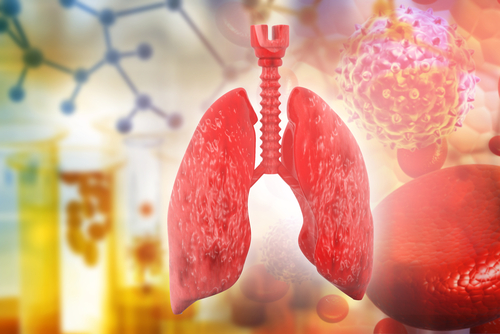Researchers Identify Markers that May Contribute to Acute Symptoms Worsening in IPF Patients

Increased levels of the signaling molecule IFN-gamma in the blood, as well as of other pro-inflammatory proteins and immune-response activators, can contribute to the worsening of acute symptoms in patients with idiopathic pulmonary fibrosis (IPF), a study finds.
Therefore, assessment of these particular molecules may help predict IPF acute exacerbations, and support the development of strategies to prevent them.
The findings were reported in a study, “Prognostic value of IFN-γ, sCD163, CCL2 and CXCL10 involved in acute exacerbation of idiopathic pulmonary fibrosis,” published in the journal International Immunopharmacology.
Acute deterioration of respiratory function, also known as acute exacerbations (AE), can significantly impact the clinical outcome of IPF patients. These acute events have been reported to occur in about 14% of IPF cases within the first year after diagnosis, increasing up to 20% at three years after diagnosis.
Upon the onset of acute exacerbations, more than 90% of patients require intensive care treatment, and the associated death rate can reach up to 50%. Therefore, identifying contributing factors that could be used as biomarkers may help with early detection and prevention of these exacerbations.
Interested in Pulmonary Fibrosis research? Check out our PF forums and join the conversation!
In the study, a team of Chinese researchers evaluated the levels of several pro-inflammatory proteins, as well as immune-response activators, in 28 IPF patients who were experiencing acute exacerbations, and compared them with those of 32 IPF patients with stable disease and 18 healthy volunteers.
Results showed that, compared with patients with stable disease, patients with AE-IPF had worse forced vital capacity (FVC) and diffusing capacity of the lungs for carbon monoxide (DLCO), two common outcomes indicative of poor respiratory function. These patients also had significantly higher C-reactive protein (CRP) and lactate dehydrogenase (LDH) levels, which suggests ongoing active inflammation and tissue damage.
Analysis of specific signaling molecules revealed that blood levels of IL-1alpha, IL-1beta, IL-6, CXCL8, IFN-gamma, TNF-alpha, sCD163, CXCL10, CCL2, and CCL4 were elevated in both AE-IPF and stable disease groups compared with controls.
In particular, IL-1beta and IFN-gamma were found to be 1.4 times higher in AE-IPF patients compared with those with stable disease — IL-1beta of 2.7 pg/ml in the AE-IPF group versus 1.9 pg/ml in the stable group, and IFN-gamma of 8.3 pg/ml in AE-IPF patients versus 6.0 pg/ml in stable patients — “indicating more severe inflammation than that present in patients with stable IPF,” the study stated. Blood levels of the remaining molecules analyzed tended to be higher in the AE-IPF group but did not reach statistical significance.
The blood levels of these signaling molecules were not found to be correlated with the patients’ respiratory function (FVC or DLCO values). In contrast, IL-1beta and IFN-gamma blood levels were found to be positively associated with LDH, IL-6, and CRP levels (all inflammatory biomarkers).
Assessment of these same molecules in bronchoalveolar lavage fluid — from four AE-IPF patients and four patients with stable disease — revealed that CCL2 was 116 times higher in AE cases (7305.5 pg/ml) than in patients with stable disease (62.9 pg/ml), while no significant differences were found for the other molecules.
Further analysis confirmed that higher blood IFN-gamma levels were associated with a 1.24 increased risk of AE in IPF. An increase in blood IFN-gamma levels by 1 pg/ml increased the risk of AE by 24%.
Also, elevated INF-gamma, sCD163, CXCL10, and CCL2 levels were found to be associated with a poorer prognosis and increased mortality risk in this population.
Collectively, these findings demonstrate that “serum levels of some pro-inflammatory cytokines and … chemokines are upregulated during acute exacerbations of IPF, and that these exacerbations are associated with the serum IFN-gamma level,” the researchers wrote.
The team believes that “chemokines and proteins such as sCD163, CCL2, and CXCL10 are associated with activation of macrophages (a type of immune cell involved in IPF), and may have a serious impact on overall survival in patients with IPF.”
Additional studies are warranted to explore if these findings can be generalized for the entire IPF population, and if assessment of these signaling molecules can be used as prognostic markers for acute IPF symptoms worsening, the researchers said.






